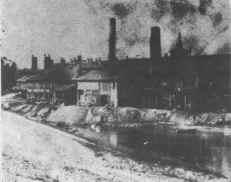|
Mercer County PAGenWeb Project |
|
Sharon Iron Works |
|||
|
The
history of the Sharon Iron
Works from its establishment in 1850 until it
passed from existence a few years ago involved many of the well-known
characters in the iron and steel industry in this county. General
[Joel B.] Curtis was president of the original stock
company, and in 1861 bought the entire plant. William
Coleman, James Westerman, C.
B. Wick and P. W.
Keller were the next set of owners, and in 1865 when the
Westerman Iron Company took control of the property its constituent
members were James Westerman, P. W.
Keller, C. H. Buhl, C. H. Andrews, W. J. Hitchcock. Mr. Westerman retired in 1874,
and in April, 1882, Christian H.
Buhl became sole owner. His son, Frank
Buhl, was general manager of the works from 1887, and the
company was known as Buhl, Sons & Co. Twentieth Century History of
Mercer County, 1909, pages 356–357. |
Westerman Iron Company (Sharon Iron Works)
1866
(Click image to enlarge) |
||
|
The
Sharon Iron Company. —One of the first citizens of
the Shenango Valley to take a lively interest in the manufacture of
iron was Gen. Joel B. Curtis,
of Sharon. He had formerly been a leading business man at Mercer, but
removed to Sharon before it was a place of any prominence, and became
active in its development. He continued to reside there until the time
of his death, August 27, 1802. Early in the forties Gen. Curtis, then a
heavy coal dealer conceived the idea of developing the iron interests
of the county. This idea, however, did not materialize until 1850, when
a stock company, with a capital of $20,000, was formed, and Gen. Curtis
was chosen president. It was known as the “Sharon Iron Company,” and
its first purpose was to establish a foundry on a large scale. Gen.
Curtis was authorized, in order to acute reliable information upon the
business, to visit the principal cities where such work was being
executed. He went to Buffalo, Albany and other important cities in the
execution of his mission. About
this time some difficulty arose in the mills at Pittsburgh. Many of the
skilled workmen were desirous of uniting their forces, and becoming
manufacturers themselves. Gen. Curtis regarded this a favorable
opportunity, and cultivated the acquaintanceship of the Pittsburgh
operatives. The sequel was the securing of their co-operation in the
Sharon enterprise. The iron workers took stock, and the charter was so
modified as to include a rolling-mill within its scope. The works were
erected before the close of the year 1850, but did not go into
operation until 1851. In addition to these works, the company also
erected dwellings for their hands, which fact gave a wonderful impetus
to the growth of the town. The iron mill ran until 1855,when it closed.
In the following year a new company took charge of the plant and fitted
it up for the manufacture of steel from raw ore. This experiment was
prosecuted without adequate success until the fall of 1857, when the
works were again closed until 1861, when the plant was bought by Gen.
Curtis, and by him sold to William
Coleman, James Westerman, C. B. Wick, Jr., and P. W. Keller, who reopened the
works. In 1865 Coleman
and Wick disposed of
their interests, and C. H. Buhl, C.
H. Andrews, W. J. Hitchcock, P. W. Keller and James Westerman became the
owners, and the name was changed to the “Westerman Iron Company.” The
furnace was built by this company in 1865-66, and they operated the
works until March, 1874, when Mr. Westerman sold his interest to his
partners. From 1805 to 1814 Mr. Westerman had the full management, and
carried on the business very successfully. On the first of April, 1882,
C. H. Buhl
became sole owner of the plant, and no change has since occurred. It is
the largest single plant in Mercer County, and furnishes employment to
nearly 700 hands. F. H. Buhl
is manager, and David Adams secretary and treasurer. Under Mr. Buhl's
management many improvements have been made, and every department of
the works brought to the highest state of efficiency. In connection with the iron interests, this company, in 1802, built a railway from their works to a coal field belonging to them, at Brookfield, Ohio, a distance of three miles. This field, embracing some 2,000 acres, yielded an output of some 500 tons daily, involving in prosperous times the employment of 400 men. The company has also operated, besides the Brier Hill block coal at Brookfield, the Home Coal Bank, with a capacity of 300 tons daily. In 1876 the company established what is known as the Sharon Iron Works store, on State Street, where an extensive trade is carried on, not only with the operatives, but with citizens generally. History of Mercer County, 1888, pages 195-196 |
|||
